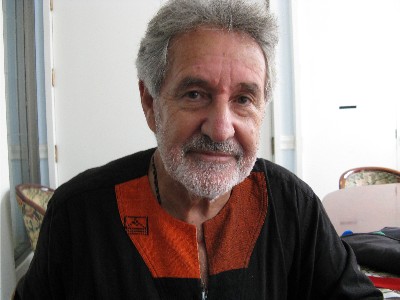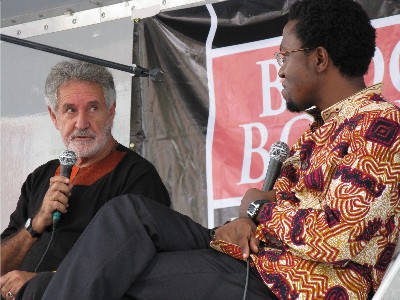Breyten Breytenbach Remembers the Last Abyss Before Hell

Breyten Breytenbach at this year’s Brooklyn Book Fair
By Bill Marx
On this week’s World Books podcast I talk to South African writer, painter, and human rights activist Breyten Breytenbach about his recently published book of mordantly fantastic fables “All One Horse.”
In America, Breytenbach is known, if at all, for his four highly unconventional volumes of autobiography, which combine memoir, travel writing, cultural criticism, and poetic allegory. Given the concerns raised about the future of South Africa with the recent ouster by the African National Congress of President Thabo Mbeki, it would be a good time to review the past four decades of South African history through the eyes of Breytenbach, a tortured soul, a self-pitying mess, a fiery but impotent exile, a perceptive reporter, a literary loose cannon.
The last book in the series, “Dog Heart: A Memoir,” came out in 1999, but Breytenbach’s eclectic approach still illuminates the continuing legacy of what he calls “the ‘hard politics of inhuman laws and repression, the pragmatism needed to live in this continent, which made everybody insensitive to the worth of human life, or simply to suffering.” (Breytenbach’s latest exercise in autobiography, “A Veil of Footsteps: Memoirs of a Nomadic Fictional Character,” was published earlier this year but is not yet available here.)
The memoirs also deal with the metaphysical and psychological ups and downs of losing a homeland, the creative opportunities generated when an artist floats between cultures. “One day I should write a book about exile, about what it is like to live turned in upon oneself, and give a description of the blunting caused by estrangement from the intimate and the familiar,” Breytenbach writes in “Return to Paradise.” The latter is part of a series encompassing the earlier “A Season in Paradise” and “The True Confessions of an Albino Terrorist” and the follow-up, “Dog Heart: A Memoir.” They combine political analysis and artistic ruminations with kaleidoscopic testaments to alienation’s visions and blind alleys. Like other outcasts, such as Milan Kundera and Czeslaw Milosz, Breytenbach rejects realism as a genre. Exile forces him to look closely at the world from different perspectives, favoring approaches that deal in the symbolic transformation of reality.
Breytenbach repudiates his identity as a white Afrikaner in poetry and prose that condemns the barbarity of the South African regime (“We are maimed, we are only half human …” he writes in “Return to Paradise”) yet finds unearthly beauty in the land, some of its people, and its history before organized white supremacy. Rootless (“a wandering monk, with an umbrella full of holes”) Breytenbach contends with clashing selves.
Breyten Backlist
“A Season in Paradise” Translated from the Afrikaans by Rike Vaughan. (1976)
“The True Confessions of an Albino Terrorist” (1985)
“Return to Paradise” (1993)
“Dog Heart: A Memoir” (1999)
“A Veil of Footsteps: Memoirs of a Nomadic Fictional Character” (2008)Bonus: “Mouroir: Mirrornotes of a Novel” (1984) features beautiful, baffling and quietly agonizing jottings from Breytenbach’s stint in a South African prison.
“A Season in Paradise,” scathing and tender, chronicles a 90-day trip Breytenbach was allowed to take in South Africa in 1973 – he couldn’t get a visa before that because of his marriage to a Vietnamese woman. The poet meditates on his past, describes the South African terrain, has a reunion with his father, mother, and family, and self-consciously identifies with Rimbaud. An ironic homage to “A Season in Hell,” the book insists the French poet fled to South Africa, a fantasy that blesses Breytenbach’s embrace of surrealism.

Bretyten Breytenbach (South Africa) and (Patrice Nganang, Cameroon) at the Brooklyn Book Fair
“A Season in Paradise” also features virulent attacks on white liberal South African writers, himself among them, for the complicity involved in getting published and tenured at universities: “All talk in this sad bitter motley-funeral-land is politics – whether it is whispering talk, talking shit, spitting into the wind or speaking in his master’s voice … Together all of us have industriously and blindly as ants, dragged this country to the last abyss before hell.”
Two years later Breytenbach secretly returned to South Africa, clumsily acting as an agent for an organization named Okhela (the Zulu word for “spark”), a part of the African National Congress that repudiated Stalinist-style communism. He was caught by the police and sentenced to nine years in prison, of which he served seven, two of them in a maximum-security cell. “The True Confessions of an Albino Terrorist” was written after his release: its gaunt splendor is a worthy of other modern reminiscences of captivity from Eastern Europe and the Middle East. More sociological than the earlier volume (there are horrifying descriptions of the treatment of blacks and coloreds, and speculation on the roots of Afrikaner racist psychology), the book still offers flights of imaginative freedom, as when Breytenbach suddenly infiltrates the psyche of a guard or a fellow prisoner.
If “A Season in Paradise” and “The True Confessions of an Albino Terrorist” ruminate on South Africa’s authoritarian past, “Return to Paradise” and “Dog Heart” examine the country’s future after the release of Nelson Mandela and the white government’s acceptance of democracy and multi-racial rule. Writing after another three-month visit to South Africa in 1991, Breytenbach acknowledges the changes but despite (or because of) the transformation he embraces a darker and despairing tone that verges on the apocalyptic.
Though Breytenbach continued to agitate during the late ‘80s – he was a party to meetings in West Africa that set the groundwork for legalizing the ANC – he didn’t see the end of apartheid as necessarily translating into cultural or social stability, let alone racial peace. To Breytenbach, the country is still “awash in blood” and the West doesn’t care “two rusty ha’pennies about our continent sinking in the mire of famine and plagues and imploding structures.” The author comes off as a stand-up prophet in “Return to Paradise” – a kvetcher of gloom. In “Dog Heart” he mellows a bit, tending towards the nostalgic, preferring to celebrate the natural beauties of South African rather than excoriate the country’s politics.
Bretyenbach’s acidic, self-involved persona won him new enemies among South African reformists (a friend calls him “a misery sponge”), and even admirers of his poetry are not as enthusiastic about his prose. To Nobel Laureate J. M. Coetzee, Breytenbach’s memoirs “give in too easily to the narcissism that always imperils self-writing — narcissism and prolixity.” Admittedly, “Return to Paradise” and “Dog Heart” are the weakest of the four volumes, partly because they aren’t as sharply focused; instead of detailed recreations of the past or of prison, Breytenbach stumbles through time and space, feeling redundant and dazed in the face of tribal killing and economic chaos. It’s ironic that he has never felt more marginal as a citizen or an artist than with the liberation of his country: “Why will I not return to stay? Too late now. Foreigner here. Painted monkey. Bitter dreams. No roots. Attachment too painful. Deathwish …”
Breytenbach pumps up his ego by admiring himself for uttering truths “exaggerated with the innocence of a savage.” Going too far, even for the sake of art, is not always a virtue. Though his pessimism is somewhat leavened by a touching meditation on the death of his beloved father and his eagle-eye descriptions of landscapes, urban and natural.
Yet for all of their interludes of myopic navel-gazing, Breytenbach’s memoirs proffer a distinctively ornery imagination, a jittery fragmentation, that gets at nasty corners of experience ignored by the more conventional, realistic novels of such acclaimed South African writers as Andre Brink, Nadine Gordimer, and Coetzee. Desmond Tutu, in a statement on the resignation of Mbeki, says the “so-called recalling of the President of our land fits the pattern of the settling of scores and the throwing about of weight that has happened post-Polokwane.” Breytenbach’s jaundiced perspective remains relevant to South Africa and its governance today because of the dreamy brutality of his prose, its erratic but brilliant insight into the mechanics of eye-for-an-eye opportunism
Tagged: Books, Breyten-Breytenbach, Featured, Podcast, all-one-horse

Breytenbach’s ‘Confessions of an Albino Terrorist’ is 96% nonsense, badly written and if he was half as clever/intelligent as he thinks he is, why did did the brainless, stupid police catch him so easily. On what grounds does he think that he was entitled to be treated like a VIP head of a super power by the Nationalist government? He and the left wing babes in the woods should grow up.